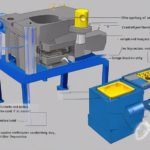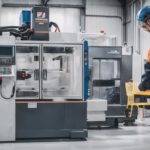Selecting the best materials for plastic injections hinges on evaluating mechanical stress resistance, energy absorption capabilities, high-temperature tolerance, and resistance to corrosion. Understanding thermoplastic properties such as transparency, fatigue resistance, and impact strength aids in material selection. Alloys like PC/ABS and PC/PBT offer enhanced strength and heat resistance, essential for industries like automotive and electronics. Glass fibers and carbon fibers add strength and resistance to materials, while additives customize properties like color and lubrication. For expert guidance and tailored material selection, consulting professionals guarantees project requirements are met. Explore further into material selection to enhance product quality and performance.
Material Properties Considerations
When selecting materials for plastic injections, meticulous consideration of material properties is essential to guarantee peak performance and quality of the final product. Key material properties to assess include strength, impact resistance, temperature resistance, chemical resistance, and UV resistance.
Strength is critical to confirm the plastic part can withstand mechanical stresses without deforming or breaking during the injection molding process or in its application. Impact resistance is crucial for applications where the plastic part may experience sudden impacts or loads, requiring the material to absorb energy without fracturing.
Temperature resistance is vital to determine if the material can withstand the high temperatures involved in the injection molding process without degrading. Chemical resistance ensures the material can resist corrosion or degradation when exposed to various chemicals during its service life.
UV resistance is important for outdoor applications to prevent degradation or discoloration when exposed to sunlight. Proper evaluation of these material properties is essential in selecting the most suitable material for plastic injections.
Thermoplastic Material Comparison

Evaluating thermoplastic materials involves a thorough assessment of their distinct properties and characteristics to identify the most appropriate option for specific applications.
Amorphous thermoplastics such as acrylic and polycarbonate are known for their transparency and lower melting points, making them suitable for applications requiring optical clarity.
On the other hand, semicrystalline thermoplastics like nylon polyamide and polyethylene offer excellent fatigue and stress cracking resistance, ideal for high-stress environments.
Thermoplastic materials like ABS and TPU provide a balanced mix of toughness, impact resistance, and flexibility, offering versatility across various applications.
Specific thermoplastics such as POM and TPE exhibit unique properties like low friction, high stiffness, and good chemical resistance, catering to specific application needs.
Understanding the distinctions between thermoplastic types is essential for selecting the right material based on properties like transparency, strength, and resistance to environmental factors.
Alloy Selection Overview

Alloy selection in plastic injection molding plays a vital role in determining material strength and corrosion resistance. By combining different materials, manufacturers can tailor alloys to meet the specific requirements of various industries.
Understanding these key properties is essential for selecting the most suitable alloys to achieve peak performance in plastic injection molding applications.
Material Strength
Selecting materials with superior strength characteristics is a fundamental aspect of alloy choice in plastic injection molding processes. When considering material strength in alloy selection for plastic injection molding, the following key points should be taken into account:
- PC/ABS and PC/PBT alloys are preferred for their enhanced strength, heat resistance, and low shrinkage properties.
- PC/ABS alloys offer a balance of strength, impact resistance, and heat resistance, making them suitable for various applications.
- PC/PBT alloys combine toughness with stiffness, providing excellent mechanical properties and dimensional stability.
Alloy selection is essential for meeting specific requirements in industries like automotive, electronics, and consumer products. Understanding the unique benefits of different alloys helps in choosing the right material for achieving desired product performance and quality.
Corrosion Resistance
In achieving peak performance in plastic injection molding processes, the consideration of corrosion resistance plays an important role in selecting suitable alloys. Alloys like PC/ABS and PC/PBT are favored for their high resistance to chemicals, moisture, and corrosive environments, making them ideal for applications in harsh conditions. Understanding the specific corrosive elements present in the environment is key to choosing the right alloy for long-lasting performance. In industries such as automotive, electronics, and marine applications, corrosion resistance is vital to guarantee the durability and reliability of the final product. Below is a table highlighting the corrosion resistance properties of PC/ABS and PC/PBT alloys:
| Property | PC/ABS | PC/PBT |
|---|---|---|
| Resistance to Chemicals | High | High |
| Resistance to Moisture | Excellent | Good |
| Corrosive Environments | Resistant | Resistant |
Filler and Additives Guide

Understanding the strategic incorporation of fillers and additives is essential for optimizing the performance and customization of plastic injection molding materials. When selecting materials for plastic injections, considering the following filler and additives guide can have a profound impact on the final product:
- Glass fibers in fillers enhance material strength and provide reinforced strength with low density in injection molding materials.
- Carbon fibers in fillers offer resistance to creep and corrosive environments, improving material properties for specific applications.
- Additives in injection molding materials can customize properties like color, self-lubrication, or anti-static capabilities without altering the material composition significantly.
- Talc fillers can enhance material properties like stiffness and dimensional stability in plastic injection molding materials.
- Understanding the role of fillers and additives is essential for optimizing material performance and customization in plastic injection molding processes.
Expert Assistance for Material Selection

Integrated Molding Solutions offers invaluable expertise in guiding material selection processes for plastic injection molding projects. Their consultation spans from the initial concept to the finished product, guaranteeing the chosen plastic material aligns with the project's requirements.
By focusing on properties such as impact resistance, temperature resistance, and higher tensile strength, they help optimize the finished product's performance. Integrated Molding Solutions also considers factors like heat deflection temperature to meet industry standards and functional needs effectively.
Their expert assistance aids in selecting materials that not only enhance the quality of the product but also contribute to environmentally responsible manufacturing practices. By leveraging their knowledge, clients can benefit from tailored material selection that meets specific production demands efficiently.
This approach ensures that the chosen materials result in a final product that excels in durability, functionality, and overall performance, catering to a wide range of industries' needs.
Impact of Material on Manufacturing

The choice of materials has a significant impact on the efficiency of manufacturing processes in plastic injection molding. This impact is seen through factors such as melt flow rates, cooling times, and pressure requirements. Proper material selection is crucial for enhancing production efficiency by ensuring smooth mold cavity filling and quality part production.
Understanding the behavior of different materials is essential to avoid inefficiencies and unexpected costs during manufacturing. Different materials offer varying benefits, including design flexibility, waste reduction, and increased repeatability. The right material choice can optimize production processes, reduce manufacturing costs, and improve overall part quality in plastic injection molding.
Frequently Asked Questions
How to Select Plastic Material for Injection Molding?
Selecting plastic material for injection molding involves evaluating properties like tensile strength, flexural modulus, and impact resistance to guarantee top performance. Factors such as electrical insulation, chemical resistance, and regulatory compliance must be taken into account.
Understanding the distinctions between amorphous and semicrystalline thermoplastics aids in material selection. Specific thermoplastics like POM, polypropylene, ABS, TPE, and TPU offer tailored solutions.
Utilizing fillers and additives can further enhance material properties for improved strength, durability, and functionality.
How Do You Choose the Right Plastic Material?
Selecting the appropriate plastic material involves a thorough analysis of factors such as mechanical properties, chemical resistance, regulatory compliance, and cost considerations.
Akin to a skilled artisan selecting the finest brushstroke for a masterpiece, choosing the right plastic material requires a keen eye for detail and a deep understanding of the material's characteristics.
This process demands in-depth research, consultation with experts, and a holistic evaluation of the material's suitability for the intended application.
What Is the Best Material for Plastic Injection Molding?
The best material for plastic injection molding varies based on factors such as mechanical properties, chemical resistance, and intended application. Common materials like ABS, polypropylene, polystyrene, and POM offer distinct advantages.
Material selection influences product quality, durability, and manufacturing efficiency. Understanding properties like tensile strength, impact resistance, and thermal stability is essential for the most suitable material choice.
Consultation with material experts aids in selecting the most appropriate material for specific injection molding needs.
What Are the Characteristics Should Have for Selection of Mold Material?
When selecting mold materials, key characteristics to take into account include hardness, wear resistance, thermal conductivity, and corrosion resistance. These factors are essential in ensuring the durability and longevity of molds.
Different materials like steel alloys, aluminum, and beryllium copper offer specific properties for various applications. Understanding these characteristics is vital for making informed decisions in mold material selection.
Conclusion
To wrap up, selecting the appropriate materials for plastic injections necessitates careful consideration of:
- Material properties
- Thermoplastic comparisons
- Alloy selection
- Filler and additives
- Expert assistance
As the saying goes, 'Choose the right tool for the job.' By analyzing the impact of materials on manufacturing processes, manufacturers can guarantee top-notch performance and efficiency in their plastic injection projects.







